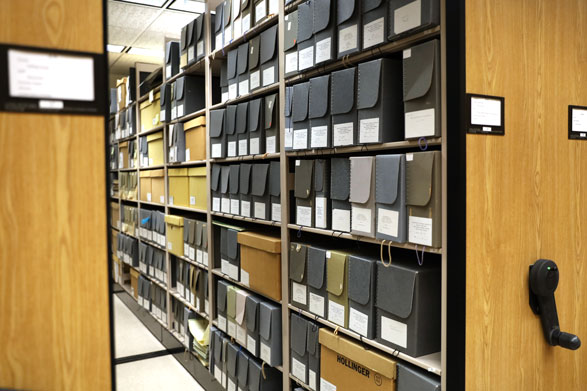Archives
Records Management
Records Management is the field of management responsible for the efficient and systematic control of the creation, receipt, maintenance, use and disposition of records.

What is a record?
Records aren’t just paper documents. They include any recorded information, regardless of medium or characteristics, created, received, and maintained by an organization or person. This includes photographs, audio and video recordings, and College or departmental publications.
Records Consultation
The Department of Archives and Special Collections provides assistance to all College departments and offices to help them efficiently manage institutional records. This is important because well-managed records are an asset to the College, while unmanaged records are a liability.
Archives staff are available to work with departments and offices to:
- help them apply retention requirements,
- create a department- or office-specific schedule,
- provide advice on storage, organization, and digitization.
For questions related to records management at Rollins, please contact archives@rollins.edu.
Records Management Policies
The Archives maintains a General Records Retention Schedule to ensure that
- college records are maintained to meet all legal, fiscal, administrative, and operational requirements,
- records of historic value are identified and transferred to the Archives,
- records that are no longer needed for legal, fiscal, administrative, or operational requirements are destroyed as prescribed by law.
The General Records Retention Schedule may be supplemented by department- or office-specific schedules as needed and is only available to Rollins community members who sign in.
In addition, the College administers several policies relevant to records management. You will need to login with your FoxID to view these resources:
- Policy for the Preservation of Electronically Stored Information
- Data Security and Stewardship Policy
- Policy on the Archiving of College Email
- Viewing of Personnel Records
Records Transfers
All records of enduring value, when no longer in current use in the department or office to which they pertain, should be transferred to the Archives. Collecting these records (both paper and electronic) allows us to document the development and growth of the College, including its functions of teaching and research, its role in the community at large, the activities of its faculty, student body and alumni, and the development of its built environment and landscape of the campus.
See Records Transfer Procedures (PDF) for transfer instructions and guidelines on what—and what not—to transfer to the Archives.